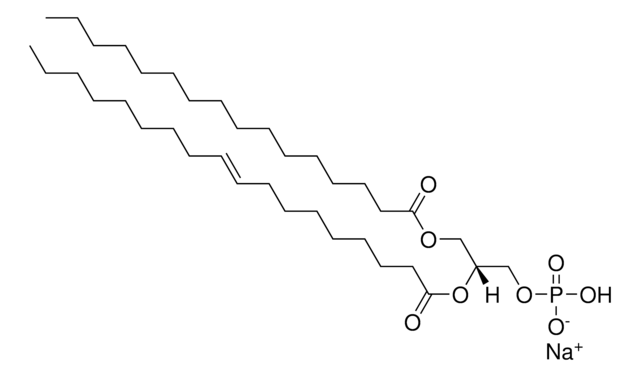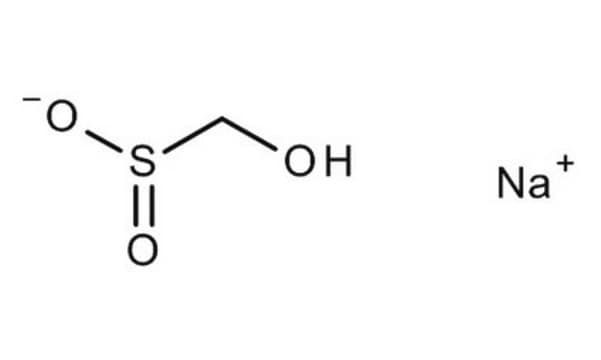840861C
Avanti
18:0-18:1 PA
1-stearoyl-2-oleoyl-sn-glycero-3-phosphate (sodium salt), chloroform
Synonym(s):
1-octadecanoyl-2--(9Z-octadecenoyl)-sn-glycero-3-phosphate (sodium salt); SOPA; PA(18:0/18:1(9Z))
About This Item
Recommended Products
Assay
>99% (TLC)
form
liquid
packaging
pkg of 1 × 2.5 mL (840861C-25mg)
manufacturer/tradename
Avanti Research™ - A Croda Brand 840861C
concentration
10 mg/mL (840861C-25mg)
lipid type
phospholipids
shipped in
dry ice
storage temp.
−20°C
SMILES string
[Na+].[P](=O)([O-])(OC[C@H](OC(=O)CCCCCCC\C=C/CCCCCCCC)COC(=O)CCCCCCCCCCCCCCCCC)O
InChI
1S/C39H75O8P.Na/c1-3-5-7-9-11-13-15-17-19-21-23-25-27-29-31-33-38(40)45-35-37(36-46-48(42,43)44)47-39(41)34-32-30-28-26-24-22-20-18-16-14-12-10-8-6-4-2;/h18,20,37H,3-17,19,21-36H2,1-2H3,(H2,42,43,44);/q;+1/p-1/b20-18-;/t37-;/m1./s1
InChI key
QTWIAVIWKTYOHY-HTNAYUJGSA-M
General description
Application
- as a phosphatidic acid (PA) standard to identify the corresponding radiolabeled PA on the thin-layer chromatography (TLC)
- in vesicles for experimental validation in order to identify novel phospholipids capable of inhibiting cellular membrane transportation by (ATP)-binding cassette P-glycoprotein (P-gp)
- to treat young adult mouse colonic (YAMC) cells prior to nanoclustering- forster resonance energy transfer (FRET) analysis(6)
Biochem/physiol Actions
Packaging
Legal Information
Signal Word
Danger
Hazard Statements
Precautionary Statements
Hazard Classifications
Acute Tox. 3 Inhalation - Acute Tox. 4 Oral - Aquatic Chronic 3 - Carc. 2 - Eye Irrit. 2 - Repr. 2 - Skin Irrit. 2 - STOT RE 1 - STOT SE 3
Target Organs
Central nervous system, Liver,Kidney
WGK
WGK 3
Regulatory Listings
Regulatory Listings are mainly provided for chemical products. Only limited information can be provided here for non-chemical products. No entry means none of the components are listed. It is the user’s obligation to ensure the safe and legal use of the product.
PRTR
Class I Designated Chemical Substances
ISHL Indicated Name
Substances Subject to be Indicated Names
ISHL Notified Names
Substances Subject to be Notified Names
JAN Code
840861C-BULK:
840861C-VAR:
840861C-25MG:4548173368825
Choose from one of the most recent versions:
Certificates of Analysis (COA)
Sorry, we don't have COAs for this product available online at this time.
If you need assistance, please contact Customer Support.
Already Own This Product?
Find documentation for the products that you have recently purchased in the Document Library.
Our team of scientists has experience in all areas of research including Life Science, Material Science, Chemical Synthesis, Chromatography, Analytical and many others.
Contact Technical Service










